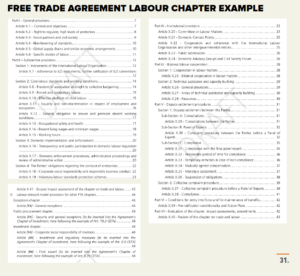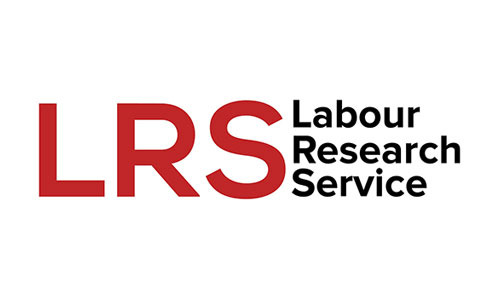The issue of including and enforcing labour standards through trade deals is contentious and hotly debated in trade policy and labour advocacy circles.
Proponents say labour standards in trade deals are necessary to ensure countries and companies do not gain an unfair competitive advantage by denying workers their basic rights. On the other hand, opponents – mainly developing countries – oppose labour provisions in trade deals arguing such rules are protectionist and would lower their competitiveness in global markets.
Given the importance of trade and market access to the economic growth strategies of African countries, the linkage between trade, labour and gender dimension is a crucial issue for all stakeholders. The African Continental Free Trade Area (AfCFTA) agreement does not include any labour provisions or any reference to the creation of decent work. Yet there’s increasing support for the trade-labour linkage. Global trends show Free Trade Agreements (FTAs) are increasingly including provisions for labour.
What are labour provisions?
DEFINITION
Labour provisions: Any standard which addresses labour relations or minimum working terms or conditions, mechanisms for monitoring or promoting compliance, and/or a framework for cooperation.
~International Labour Organisation
Labour is a central part of trade and should be included in any relevant agreement. Labour provisions within FTAs can support the Decent Work Agenda of the International Labour Organisation (ILO). ILO’s Decent Work Agenda has four pillars: employment creation, social protection, rights at work and social dialogue. Incorporating these pillars into FTAs can significantly contribute towards social justice for all workers.
77 trade agreements globally included labour provisions, compared with three in 1995.
Trade agreements with and without labour provisions – 1995 to 2016
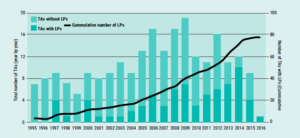
Only two major regional trade agreements in Africa – The Common Market for Eastern and Southern Africa (COMESA) and the East African Community (EAC) – have labour provisions.
Overview of policy areas covered in the AfCFTA and regional trade agreements
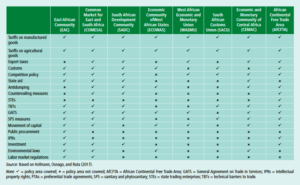
Source: World Bank Group
It’s not too late to have labour provisions included in the AfCFTA and trade unions have the opportunity to contribute here. As noted by professor of law at the University of South Africa, Babatunde Fagbayibo, “there is still an opportunity to ensure that after it comes into force, member states are mandated to implement the AfCFTA within a more democratic context.”
Here are some key arguments for and against labour provisions and the steps trade unions can consider when preparing their counter-arguments against inclusion.
ARGUMENTS FOR NOT INCLUDING LABOUR PROVISIONS IN FTAs
- Trade will lead to improved labour standards: The major argument by opponents is that trade leads to improved labour standards. But trade unions know this is not always the case. The impact of trade on labour standards can differ from country to country. Given that countries experience the impacts of labour standards differently, we should question how improvements will be measured within the AfCFTA. But one thing is clear. In the absence of labour provisions in the trade agreement, it’ll be difficult to hold countries accountable for poor labour practices.
- Developing countries view labour provisions as a threat to their main asset for attracting international investors – low wages: In the context of the AfCFTA, there are important lessons to be learned from historic opposition to labour provisions in trade agreements. Developing countries viewed them as a form of protectionism from developed nations. By agreeing to labour provisions, developing countries believed they’d lose their competitive advantage in cheap labour. But the evidence doesn’t show the premise to be correct. Rather, research shows that improving labour conditions can lead to economic growth.
ARGUMENTS FOR INCLUDING LABOUR PROVISIONS IN FTAs
- Trade will lead to a race to the bottom where workers will be the biggest losers: Countries become exposed to competition within trade liberalisation. In the AfCFTA context, this will be between similar developing countries but also countries much more developed than others. To become more attractive for investors, governments are forced to lower their regulations and as a result the cost of labour. A “race to the bottom” is created in which countries undercut each other to be the most preferred. Thus, labour provisions are necessary for achieving decent work.
- The inclusion of labour provisions will increase labour market access to women: The AfCFTA commits to achieving gender equality and gender equity. However, it’s difficult to understand how the agreement is set to achieve these goals without the inclusion of labour provisions. The ILO notes that the ability of women to access jobs is increased under agreements that explicitly address labour compared to those that don’t. For instance, the gender wage gap remarkably reduced (80%) under the Cambodia-United States Bilateral Textile Agreement because it had labour provisions. Proper labour provisions would ensure women in Africa have decent work. And given that many women earn a precarious living in the informal sector, the AfCFTA ought to include labour provisions. The agreement must also commit to integrating labour in all its aspects.
THE TRADE UNION RESPONSE TO THE LACK OF LABOUR PROVISIONS IN THE AFCFTA
How do we argue for the inclusion of labour standards in the AfCFTA for the benefit of all workers?
1. Build your argument
Get to know the arguments for and against the inclusion of labour provisions. Keep in mind that without the provisions for labour in the AfCFTA, the stakeholders cannot be held accountable.
2. Decide which standards and commitments should be included
Standards and commitments make an agreement binding or accountable according to a certain set of principles. According to Anne Posthum, a specialist for employment and labour market policies at ILO, the overall trend in agreements can be summarised by the following:
- Reference to ILO norms
- Commitment to minimum labour standards
- Enforcement of national law – Consultative mechanism
- Clause to not weaken labour law to attract investment and trade
Generally, three categories of commitments exist in FTAs. They are international labour standards, mutually agreed standards and domestic labour law. The most popular of commitments is the international labour standards, with nearly 65% of trade agreements referring to the Core Labour Standards in the 1998 Declaration of ILO. The Core Labour Standards (CLS), are:
- Freedom of association and the effective recognition of the right to collective bargaining
- The elimination of all forms of forced or compulsory labour
- The effective abolition of child labour
- The elimination of discrimination with respect to employment and occupation.
Reference to ILO instruments in trade agreements | 2016
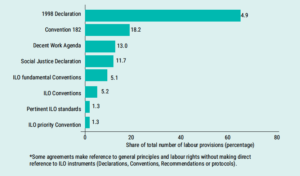
Source: ILO
There are two main advantages of having the ILO Conventions in trade agreements. First, they are monitored by the ILO. Second, the different agreements have coherence.
3. Demand a dedicated labour section in the AfCFTA
The AfCFTA negotiations are still ongoing and unions must demand that labour is included and recognised in all sections in addition to a dedicated labour section. There are two ways labour provisions are normally included in FTAs:
- A memorandum attached to the FTA, with or without reference thereof in the actual agreement
- In the main text of the FTA, normally as a labour chapter or in chapters on sustainability, cooperation or investment
What should labour provisions in the AfCFTA look like?
LRS/ITUC-Africa Model labour provision chapter and the relevant sub-sections
Source: LRS/ITUC AfCFTA Trade Union Guide (2021), based on Gött & Abel (2017)
Click here to enlarge the image
4. The AfCFTA must acknowledge and respect national labour laws and legislative frameworks
Trade unions must be involved in all future AfCFTA negotiations. Only by involving all relevant stakeholders in the negotiations and being transparent in its approach can a transformative AfCFTA be achieved. There must be evidence that its approach is people-centred rather than business-centred. This is important not only at the continental level, but also at the national level:
- Demand a seat at all AfCFTA negotiations.
- Demand that your local government does not conduct AfCFTA-related negotiations, such as tariff reductions, without your input.
- Take a negotiating position based on the union’s assessment of the impact on members.
5. Make clear demands for the inclusion of gender in labour provisions
The AfCFTA commits to gender equality and equity. But without the inclusion of labour provisions, the gender objectives set out in the agreement can’t be achieved. Given the gender equality emphasis in the AfCFTA, the ILO says gender references can be exclusively mentioned in labour provisions. Gender mainstreaming should happen together with labour mainstreaming in the AfCFTA.
6. Be attentive to the wording used
Regarding standards and commitments in labour provisions, the correct wording is of the greatest importance. There is a clear difference between a clause such as:
“shall strive to ensure that its laws provide for labour standards consistent with the internationally recognized labour rights”
Vs
“shall not fail to effectively enforce its labour laws” (Engen, 2017: 22)
The latter clause is appropriate because it allows for holding parties accountable in the court of law.
7. Encourage promotional compliance mechanisms
Enforcement mechanisms can either be incentive-based (soft approach), sanction-based (hard approach), promotional approach or pre-ratification approach.
The incentive-based approach involves the resolution of non-compliance through consultation, social dialogue, reviews, and technical assistance. Committees or panels of experts, for example, are appointed to mediate and resolve disputes. The European Union makes use of the incentive-based approach in all its agreements, save for one.
The sanction-based approach involves imposing economic penalties either through fines or trade sanctions. Often this approach is used together with the incentive-based approach. An economic penalty is given only if the parties in dispute are deadlocked. There’s scant evidence showing the sanction-based mechanism actually works. This is compared to the incentive-based approach, which is proven to be effective mainly because the culprits don’t get any form of punishment.
The promotional approach aims to strengthen domestic labour institutions, through knowledge sharing, dialogue, capacity building and technical assistance. Various studies show that a country’s ability to enact and enforce labour standards can benefit workers’ rights.
In the pre-ratification approach, improving labour standards is a pre-condition for ratifying the agreement. Most experts think the pre-ratification approach is the most effective. Given the large number of countries which have already ratified the AfCFTA agreement, the pre-ratification approach is a missed opportunity but worth noting for future negotiations of agreements.
8. Unions and civil society as monitoring agents
It’s difficult to monitor the impact of labour provisions in trade agreements. Hence unions should take the monitoring responsibility and ensure labour standards are implemented. Also, having labour provisions in the AfCFTA won’t necessarily translate to decent work creation in countries. Labour provisions should be viewed as a tool through which trade unions can demand accountability and monitor progress.
“To sum up, it’s clear that the effectiveness of both the conditional and the promotional labour provisions crucially depends on the political will of partner countries. Therefore, the role of accompanying advocacy action by civil society actors, in particular workers’ organizations, has been instrumental in activating the different dimensions of labour provisions. Civil society keeps on reminding governments that they have the responsibility to make sure labour provisions don’t remain hollow phrases and are actually turned into action.”
– Liesbet Vangeel, FOS
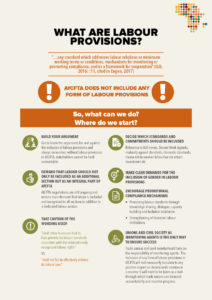
You might like:
Unpacking the African Continental Free Trade Agreement: The objectives of the AfCFTA
Marie Daniel
Marie Daniel is an Associate at Labour Research Service. Marie has an urban studies and development economics background and one of her research passions is organisation and participation approaches within the informal sector. She is intrigued by the manner in which participatory democracy is approached and implemented in South Africa.

